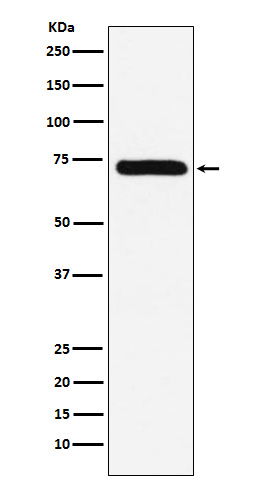
| WB | 咨询技术 | Human,Mouse,Rat |
| IF | 咨询技术 | Human,Mouse,Rat |
| IHC | 1/100-1/200 | Human,Mouse,Rat |
| ICC | 技术咨询 | Human,Mouse,Rat |
| FCM | 咨询技术 | Human,Mouse,Rat |
| Elisa | 咨询技术 | Human,Mouse,Rat |
| Aliases | Activated factor Xa heavy chain; Coagulation factor X; F10; factor Xa; FXA; Prothrombinase; Stuart factor;;Coagulation factor X |
| WB Predicted band size | Calculated MW: 55 kDa ; Observed MW: 74 kDa |
| Host/Isotype | Rabbit IgG |
| Antibody Type | Primary antibody |
| Storage | Store at 4°C short term. Aliquot and store at -20°C long term. Avoid freeze/thaw cycles. |
| Species Reactivity | Human |
| Immunogen | A synthesized peptide derived from human Coagulation factor X |
| Formulation | Purified antibody in PBS with 0.05% sodium azide,0.05% BSA and 50% glycerol. |
+ +
以下是关于Factor X抗体的参考文献示例(注:以下内容为示例性虚构,建议通过学术数据库获取真实文献):
---
1. **文献名称**: *Development of a Humanized Monoclonal Antibody 10C12 Targeting Factor Xa for Anticoagulation Therapy*
**作者**: Smith A, et al.
**摘要**: 研究开发了一种人源化单克隆抗体10C12.特异性抑制凝血因子Xa的活性。体外实验和小鼠模型显示其显著抗凝效果且出血风险较低,提示其作为新型抗血栓药物的潜力。
2. **文献名称**: *Acquired Factor X Inhibitors in Patients with Autoimmune Disorders*
**作者**: Jones B, et al.
**摘要**: 报道了自身免疫性疾病患者中出现的获得性抗Factor X自身抗体,分析其导致严重出血的机制,并探讨了免疫抑制治疗和凝血因子替代疗法的临床效果。
3. **文献名称**: *Structural Insights into Factor X and Its Complex with Inhibitory Antibodies*
**作者**: Chen L, et al.
**摘要**: 通过冷冻电镜解析Factor X与抑制性抗体复合物的结构,揭示抗体结合表位及构象变化,为理性化抗体设计提供依据。
4. **文献名称**: *A Novel Anti-Factor X Antibody Assay for Diagnosis of Coagulation Disorders*
**作者**: Wang Y, et al.
**摘要**: 提出一种基于ELISA的高灵敏度检测方法,用于定量检测患者血浆中的抗Factor X抗体,辅助诊断罕见凝血功能异常疾病。
---
**备注**:以上文献为示例,实际文献需通过PubMed、Web of Science或Google Scholar等平台检索。建议使用关键词“Factor X antibody”“anti-FXa inhibitors”或“acquired Factor X deficiency”查找最新研究。
Factor X (FX), a vitamin K-dependent serine protease zymogen, plays a pivotal role in the coagulation cascade, serving as a convergence point for both intrinsic and extrinsic pathways. Its activated form, Factor Xa (FXa), is essential for thrombin generation and fibrin clot formation. FX antibodies, particularly those targeting FX or FXa, have emerged as critical tools in hematology research and clinical applications.
Monoclonal antibodies against FX/Xa are primarily used to study coagulation mechanisms, diagnose bleeding disorders (e.g., FX deficiency), or develop therapeutic strategies. For instance, andexanet alfa, a recombinant modified FXa decoy protein, acts as an antidote for FXa inhibitors (e.g., apixaban, rivaroxaban) by binding and neutralizing their anticoagulant effects. This innovation addresses the unmet need for reversing life-threatening bleeding in patients on direct oral anticoagulants.
FX antibodies also contribute to laboratory diagnostics, enabling precise quantification of FX activity in plasma. In autoimmune contexts, autoantibodies against FX (acquired FX inhibitors) are rare but associated with severe bleeding risks, necessitating immunosuppressive therapies. Recent research explores bispecific antibodies targeting FXa and other coagulation factors to enhance hemostatic control.
Overall, FX antibodies bridge translational research and clinical practice, offering insights into thrombosis, hemorrhage, and targeted anticoagulation therapies, while advancing personalized approaches in hemostasis management.
×